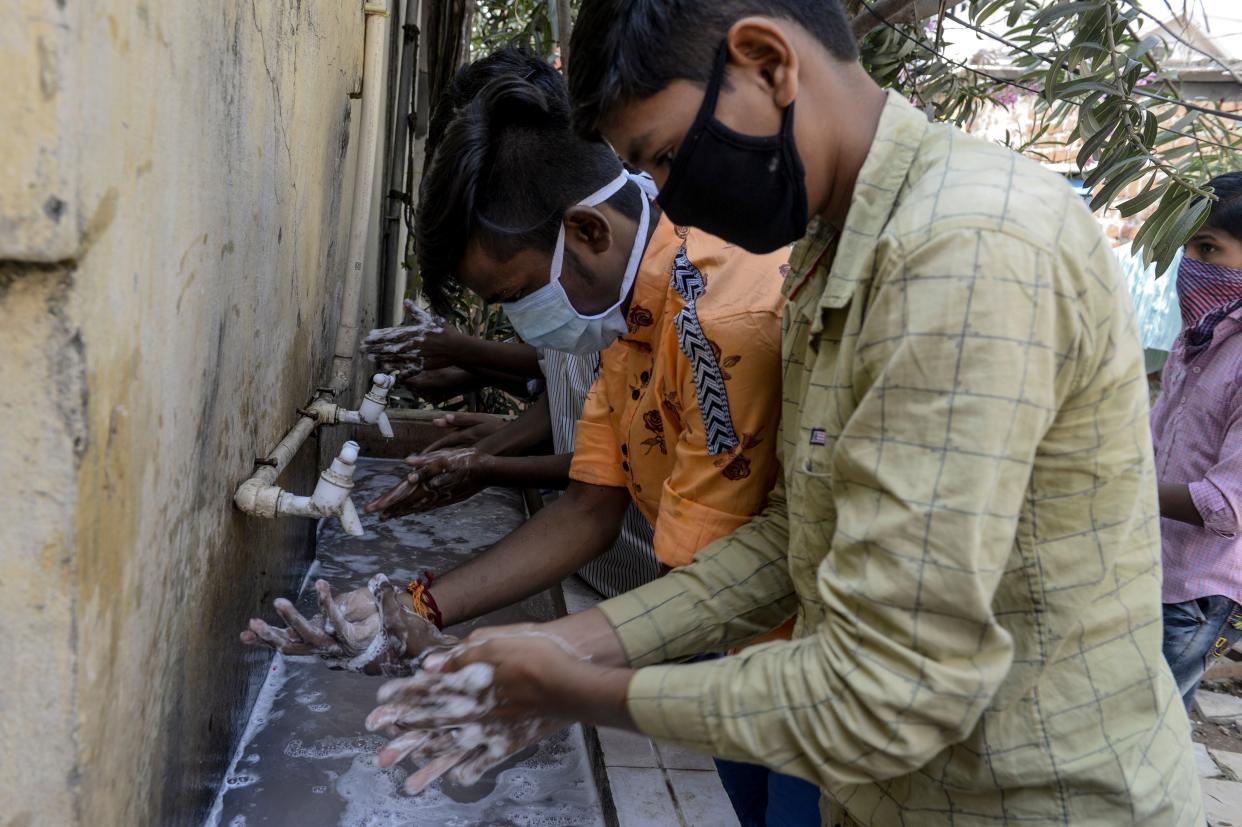Why drying your hands is important to ward off the coronavirus

Washing hands alone may not protect you from the coronavirus, with the drying process reportedly also being critical to staying infection-free.
Since emerging at a seafood and live animal market in the Chinese city Wuhan at the end of last year, the Covid-19 strain has spread into more than 90 countries.
The number of confirmed cases since the start of the outbreak exceeded 100,600 on Friday.
Read more: Should we be concerned by the ‘second strain of coronavirus’?
With no “set” treatment, prevention is all the more important, with officials urging the public to wash their hands regularly.
Soap and water should be the go-to, over sanitiser, but experts stress cleaning hands thoroughly will only go so far if they stay wet.

Since the outbreak began, more than 80,500 of the confirmed cases have been in mainland China, according to John Hopkins University data.
Incidences appear to be plateauing there, making some optimistic the outbreak may have “peaked” in its epicentre.
On 3 February, 80,200 cases had been confirmed in China, rising by 1,000 a day until 5 February.
Cases increased by marginally more on 6 February to 80,600.
Outbreaks are on the rise elsewhere, with more than 6,500 patients and dozens of deaths in South Korea alone.
Globally, the death toll stands at more than 3,400.
The UK had 163 confirmed cases on Friday.
Two Britons have died in the UK, while a third passed away after becoming infected on the quarantined “hotbed” Diamond Princess cruise ship.
The elderly and otherwise ill are thought to be most at risk, with early data showing four out of five cases are mild.
Of the 100,600 global cases, more than 55,700 have “recovered”.
Why drying your hands is important to ward off the coronavirus Covid-19
Writing in The Conversation, scientists from Swansea University said: “Hand drying not only removes moisture from the hands but it also involves friction, which further reduces the microbial load and the environmental transfer of microorganisms.
“The transmission of microbes is [also] more likely to occur from wet skin than dry skin.”
Speaking of cold and flu viruses, Dr Lisa Ackerley previously told Yahoo UK drying hands is “one extra process of preventing transmission”.
“Wet hands can transfer viruses more effectively than dry hands,” she added.
In 2018, the Swansea scientists looked at the “significance” of hand drying.
After analysing 21 research papers, they concluded “the efficacy of hand drying is a critical factor in the prevention of the transfer of microorganisms to the environment and from person-to-person following hand washing”.
The results were mainly based on bacteria, admittedly a different pathogen from the coronavirus, but the scientists insist the findings are “still relevant” amid the Covid-19 outbreak.
Read more: Coronavirus death rate higher than previously thought, officials say
Disposable hand towels are the most hygienic, with dryers potentially dispersing the virus into the air.
With Covid-19 virtually unheard of at the start of the year, little is known about how it spreads.
The main method of transmission is face-to-face via infected droplets that have been coughed or sneezed out.
Swabs of toilet bowels and sinks have also come back positive.
This suggests Covid-19 can spread via faeces and urine, as well as that it can survive on enamel or other hard surfaces.
Whether it can live on fabrics, like the towels we reuse in bathrooms, is unclear.
Cold and flu viruses are said to survive for up to 48 hours on hard surfaces and up to eight hours on cloth.
What is the best way to wash your hands?
When you go to wash your hands, the NHS advises you first wet them under running water.
While it does not specify the ideal temperature, New York's Division of Military and Naval Affairs states it should be “as hot as you can comfortably stand” - typically at least 38°C (100°F).
Next, apply enough soap to cover both hands.
Rub your hands together to create suds.
Use one hand to rub the back of the other, cleaning between the fingers as you go. Repeat with the other hand.
Read more: Dog tests 'weak positive' for coronavirus - but experts 'doubt it could spread to humans'
Rub your palms together, as well as the back of your fingers against your palms.
It is important not to forget your thumbs, which should be rubbed using the opposite hand.
The tips of the fingers should also be rubbed against the palm of the other hand.
The whole process should last around 20 seconds - the time it takes to sing Happy Birthday twice.
Finally, rinse your hands under running water, before drying them with a disposable towel.
Use the same towel to turn the tap off, which should immediately be thrown away.
When out and about, hand sanitisers should be effective providing they are made up of at least 60% alcohol.

What is the coronavirus Covid-19?
Covid-19 is one of seven strains of the coronavirus class that are known to infect humans.
Others range from the common cold to severe acute respiratory syndrome (Sars), which killed 774 people during its 2002/3 outbreak.
Most of those who initially caught Covid-19 worked at, or visited, the “wet market” in Wuhan.
Symptoms tend to be flu-like, such as fever, cough and breathlessness.
In severe cases, pneumonia can come about when the infection causes the alveoli (air sacs) in the lungs to become inflamed and filled with fluid or pus.
The lungs then struggle to draw in air, resulting in reduced oxygen in the bloodstream.
Covid-19 has no specific treatment, with care being “supportive” while a patient’s immune system works to fight off the infection.
As well as hand washing, officials recommend “social distancing” to stem Covid-19’s transmission.



